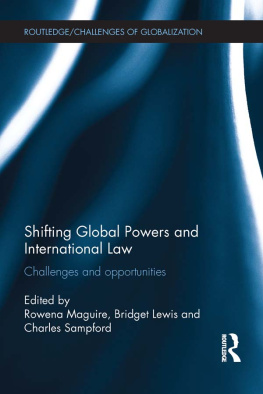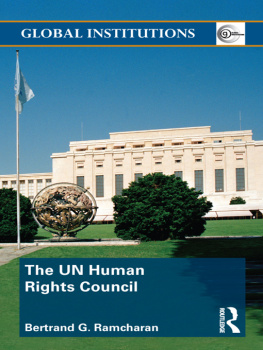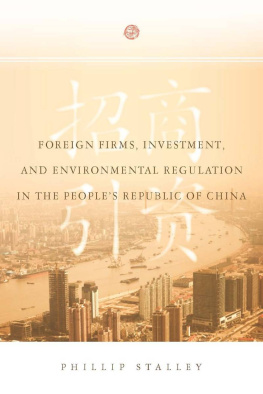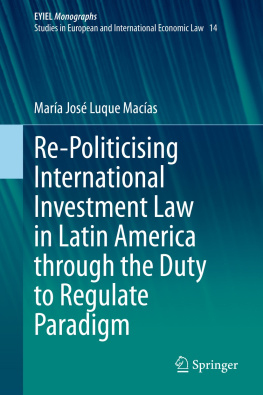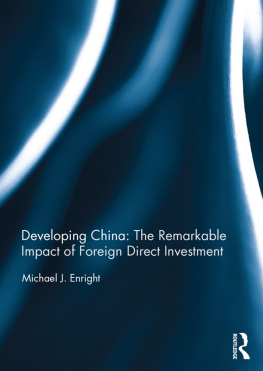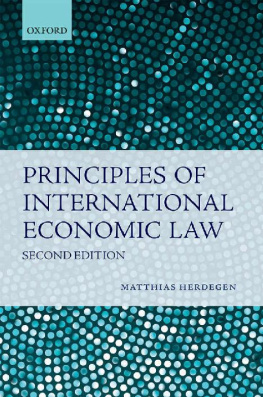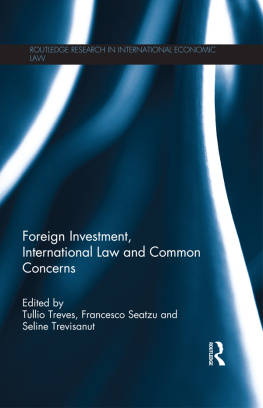M. Sornarajah
University Printing House, Cambridge CB2 8BS, United Kingdom
One Liberty Plaza, 20th Floor, New York, NY 10006, USA
477 Williamstown Road, Port Melbourne, VIC 3207, Australia
4843/24, 2nd Floor, Ansari Road, Daryaganj, Delhi 110002, India
79 Anson Road, #0604/06, Singapore 079906
Cambridge University Press is part of the University of Cambridge.
It furthers the Universitys mission by disseminating knowledge in the pursuit of education, learning, and research at the highest international levels of excellence.
www.cambridge.org
Information on this title: www.cambridge.org/9781107133624
DOI: 10.1017/9781316459959
M. Sornarajah 2021
This publication is in copyright. Subject to statutory exception and to the provisions of relevant collective licensing agreements, no reproduction of any part may take place without the written permission of Cambridge University Press.
First published 2021
Printed in the United Kingdom by TJ Books Limited, Padstow Cornwall
A catalogue record for this publication is available from the British Library .
Library of Congress Cataloging-in-Publication Data
Names: Sornarajah, M., author.
Title: The international law on foreign investment / M. Sornarajah, National University of Singapore.
Description: Fifth edition. | Cambridge, United Kingdom ; New York, NY : Cambridge University Press, [2020] | Previous edition classed in the now obsolete K3830.4 | Includes bibliographical references and index.
Identifiers: LCCN 2020047384 (print) | LCCN 2020047385 (ebook) | ISBN 9781107133624 (hardback) | ISBN 9781107590144 (paperback) | ISBN 9781108730860 (paperback) | ISBN 9781108583879 (ebook)
Subjects: LCSH: Investments, Foreign (International law) | Investments, Foreign Law and legislation.
Classification: LCC K3830 .S647 2020 (print) | LCC K3830 (ebook) | DDC 346/.092dc23
LC record available at https://lccn.loc.gov/2020047384
LC ebook record available at https://lccn.loc.gov/2020047385
ISBN 978-1-107-13362-4 Hardback
ISBN 978-1-108-73086-0 Paperback
Cambridge University Press has no responsibility for the persistence or accuracy of URLs for external or third-party internet websites referred to in this publication and does not guarantee that any content on such websites is, or will remain, accurate or appropriate.
The International Law on Foreign Investment
The international law on foreign investment has become an arena of deep contest between different interests. While investment protection remains the main interest, inflexible investment protection through compliance mechanisms like arbitration have met with considerable opposition. Such opposition was once confined to the developing nations. But with the rise of states like China and India and other smaller states with a capacity to invest overseas, developed states are seeking changes to the system they once created. New actors such as environmental and human rights lobbies also seek changes to the fragmented international law that hitherto has emphasised investment protection over other interests. Populism resents investment protection, due to the belief that it sends capital and with it jobs overseas. Climate change demands that restrictions are placed on the liberal regimes that see unrestricted flows of foreign investment. The solar energy cases against Spain and the possibility of claims following the Covid-19 pandemic have made the subject of great concern to governments and the public. A subject of low visibility is now moving to the centre stage.
The fifth edition of this book comes at a crucial time in the life of the subject. It analyses the changes that have and are taking place. This edition considers the new defences to liability, the changes in the balance between investment protection and the regulatory power of the state, the criticisms that have been made of the system and the responses to these criticisms. By offering thought-provoking analysis of the law in historical, political and economic contexts, this fully updated edition of Sornarajahs classic text captures leading trends and charts the possible course of future developments.
M. SORNARAJAH is Emeritus Professor at the Faculty of Law of the National University of Singapore.
Preface to the Fifth Edition
The previous editions of this work courted controversy. They stated a view that was favourable to developing countries. They illustrated the political nature of the law that was asymmetric, was concerned with investment protection on the pretence of effecting economic development and that promoted the welfare of the rich few against the interests of the very many poor of the world. The legitimacy of the law in the area was strained greatly by the expansionist interpretations of arbitrators and the exotic interpretations advanced by litigators before them. The results were never intended by the states making investment treaties. The reaction of the developed states to a law they had created, and stood by to watch its bite on developing countries, was severe when the law came to be used against them. Both developed and developing countries desired change. Changing investment patterns, with China, India and other industrialising states becoming exporters of investment into a West that was failing in power, presaged change. The change is in the process of being made. It will be slow, for powerful interests will resist change. But, once the move towards change has been initiated, it will be difficult to stop.
The shift from a unipolar world to a multipolar world will assist in the change. The diversity of the world will become more manifest in the formulation of the law. Different economic and political viewpoints will conflict. Their resolution will be manifested in the law through different packages of norms formulated by like-minded states. The Chinese drive towards the Belt and Road Initiative may well see the formulation of a new law of dominance imposed on other nations. Or, it may be that the older methods of hegemonic imposition of laws will be avoided as they do not achieve their aims. They provoke resistance in a world that has seen imperialism through military power and then imperialism through law. It could well be that another bout of imperialism through the law of a different nation will not have acceptance despite the enormous wealth and power that that nation might amass. One has to wait and see the outcome of the contest.
The end of globalisation, together with the Covid pandemic, will witness increasing nationalism within states. Authoritarian regimes may surface which may well look inwards rather than towards foreign investment-led development. But, the more interesting trend would be the dismantling of the institutions and laws created during the neo-liberal period and the return to the welfare state. These trends will take place at a time when the world becomes more multipolar. Regionalism will emerge, ensuring that areas that formerly were mere suppliers of natural resources are able to assert the interests of their people. The clash of interests that will occur will be more than at any previous stage in the history of this law. Smaller states may become authoritarian and corrupt. They will lean towards the authoritarian state that funds repression. The subject will continue to be fascinating because of the uncertainties of the present time.





